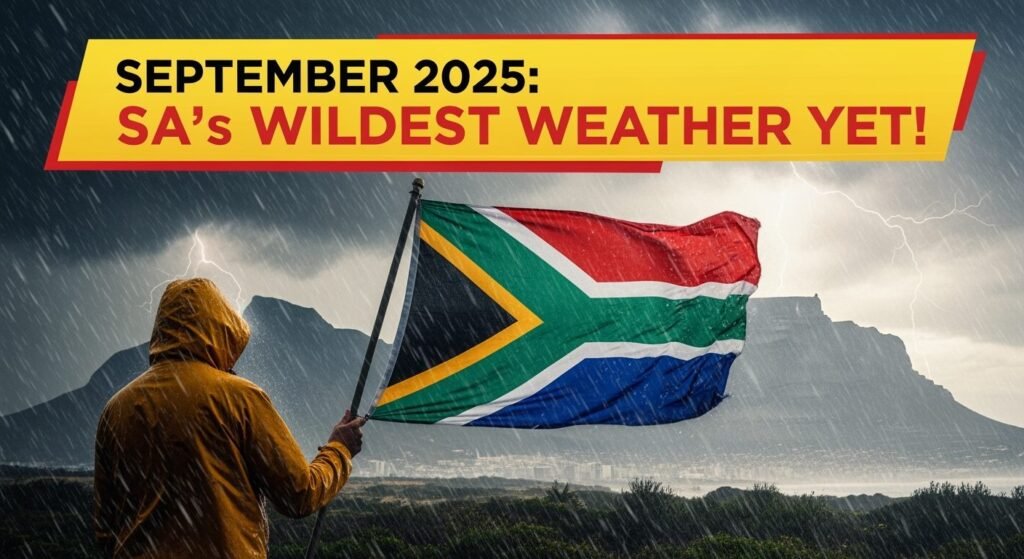South Africa Weather Alert: As we approach September 2025, I want to bring your attention to a critical weather situation developing across South Africa. Meteorological services have issued a severe weather alert warning of heavy rainfall, strong winds, and potential flooding in multiple provinces. These conditions are expected to intensify throughout the month, posing significant risks to communities in low-lying areas and informal settlements. Have you prepared your emergency kit yet? The South Africa Weather Alert indicates that we should all take precautionary measures to ensure our safety during what could be one of the most severe weather events in recent years.

What Are the Expected Weather Conditions?
The September 2025 weather alert forecasts persistent heavy rainfall across eastern and central provinces, with precipitation levels potentially reaching 150-200mm in some areas within a 48-hour period. Strong winds accompanying these storm systems may reach speeds of 80-100 km/h, particularly in coastal regions and high-altitude areas. The combination of saturated ground and continuous rainfall creates ideal conditions for flash flooding and river overflow. Temperature drops are also expected, with some regions experiencing unseasonably cold conditions that could exacerbate the discomfort and danger for vulnerable populations. The South African Weather Service has emphasized that these conditions may persist for up to two weeks, with brief intervals of moderate weather.
Why Is This Weather Alert Particularly Concerning?
This South Africa Weather Alert deserves special attention due to several compounding factors. First, the timing coincides with seasonal transitions when weather patterns are already unstable. Second, many regions have experienced drought conditions in preceding months, making soil less absorbent and more prone to runoff and flash flooding. Third, infrastructure vulnerabilities in certain areas, including inadequate drainage systems and poorly maintained roads, may amplify the impact of severe weather. The alert also comes at a time when emergency services are already stretched thin due to other ongoing challenges. Climate scientists have noted that the intensity of these weather patterns aligns with predictions related to climate change effects in the region, suggesting such extreme events may become more frequent in coming years.
How Should You Prepare for These Conditions?
- Create an emergency kit with non-perishable food, water, medications, and essential documents
- Clear gutters and drains around your property to prevent localized flooding
- Secure loose items outdoors that could become dangerous projectiles in high winds
- Stay informed through official weather channels and local emergency broadcasts
Preparation is your best defense against the dangers highlighted in the South Africa Weather Alert. Beyond the immediate steps listed above, consider developing a family emergency plan that includes evacuation routes and meeting points. If you live in a flood-prone area, identify higher ground locations where you can relocate temporarily if necessary. Charge electronic devices in advance of storms and consider investing in power banks or alternative lighting sources. For those in rural areas, ensure livestock have access to sheltered areas. Remember that preparation extends to checking on vulnerable neighbors, especially the elderly or those with mobility challenges who may need assistance during severe weather events.
When and Where Will the Impact Be Most Severe?
According to the detailed forecast, the eastern coastal provinces will likely experience the first wave of severe weather beginning September 3-5, 2025. The weather system is expected to move inland, affecting central regions by September 7-9, with potential secondary systems developing through mid-month. Urban areas with poor drainage infrastructure face heightened flood risks, while informal settlements are particularly vulnerable to both flooding and wind damage. Mountain passes and low-water bridges will become hazardous and may be closed to traffic. Rural communities may face isolation if roads become impassable, potentially limiting access to emergency services. The alert indicates that evening and overnight hours present additional dangers due to reduced visibility and the potential for rapid water level rises while residents sleep.
Real-Life Lessons from Previous Weather Events
During similar conditions in 2023, the community of Riverside in Eastern Cape demonstrated the power of collective preparation. Residents established a neighborhood alert system using WhatsApp groups to share real-time updates about rising water levels. They created community shelters in the local school, which sits on higher ground, and organized teams responsible for checking on elderly residents. When flooding did occur, their preparation meant zero casualties in an area that had previously experienced weather-related fatalities. Their example shows how community-level organization can significantly enhance official emergency responses and save lives during severe weather events like the one predicted in the current South Africa Weather Alert.




